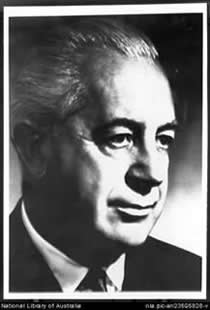85 Anticipatory motions
A motion or amendment shall not anticipate an order of the day or another motion of which notice has been given, unless the new motion or amendment provides a more effective method of proceeding.
Amendment history
Adopted: 19 August 1903 as SO 118
1989 revision: Old SO 125 renumbered as SO 85, language simplified and proviso added
Commentary

Prime Minister Harold Holt whose Government was tarnished by the VIP planes affair (Source: National Library of Australia)
Unchanged until 1989 when the language was simplified and a proviso added to give effect to a ruling of President McMullin in 1967,[1] SO 85 is rarely used. If it were interpreted literally it could be used to suppress debate on almost any subject and would therefore be unduly restrictive of the rights of senators. It is designed to prevent vexatious duplication but not to stand in the way of a better method of proceeding.
President McMullin’s ruling was given in the context of the VIP planes affair. An opposition senator had on the Notice Paper a notice of motion for an order for production of documents about use of the Royal Australian Air Force’s VIP Flight by ministers and other members of parliament. When the government tabled a ministerial statement about the matter and moved a motion to take note of it, the opposition moved an amendment to that motion in virtually the same (though not identical) terms as the notice of motion. On the basis that the amendment was a more effective means of proceeding, President McMullin overruled points of order objecting to it.
The proviso was added after the exposure draft of the revised standing orders was tabled in May 1988. It was one of a number of additions designed to make explicit hitherto implicit procedural rules that had been expounded in rulings of Presidents. Explanatory notes tabled with the final draft in November 1989 referred to the residual character of the rule against anticipation of debate on any matter on the Notice Paper. Although the rule was seldom invoked, for the sake of comprehensiveness the proviso was added as a safeguard against vexatious anticipation:
The proviso may be regarded as necessarily following from the rule: one cannot anticipate debate on a matter which is unlikely to be debated, at least in the near future, and the Senate must be free to choose between methods of proceeding on a matter.[2]
Also see SO 194.